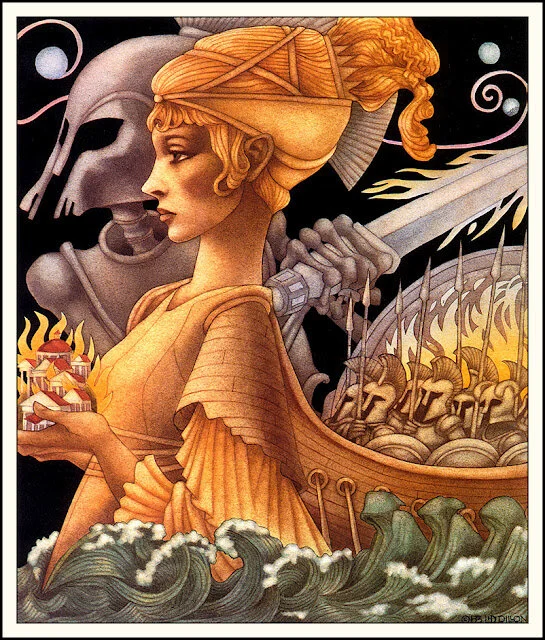A Pacifist at Troy
Cover art by Leo and Diane Dillon for the novel “A Fair Wind for Troy,” by Doris Gates. I haven’t read the book.
“Athena thought about The War. That conflict back East. That ten-year clusterduck that everyone wanted to leave behind.”
This is a sentence from the Greek mythology retelling that I’m working on. The narrator is referring to the Trojan War, only they don’t say “duck.”
In my last blog post, I reminisced none too fondly about the origins of the “War on Terror,” as launched by W. Bush. What I did not foresee was that, in August of 2021, President Biden would actually carry out the campaign promise he made—a politician? Keeping promises? What?—and withdraw troops from Afghanistan.
As the withdrawal began, and Kabul fell, I was (am) writing a book that covers the end of the Trojan War from the point of view of the gods. Me? I might as well be a god of lesser rate, sitting on Olympus, watching human suffering from afar. It’s my people that brought this about—American officials with a stupid cowboy cheerleader for their poster boy—my elected President that decided to withdraw, leaving chaos in the army’s wake.
We’re coming up on the twenty year anniversary of September 11, 2001. After that horrific day, a terrible passion overtook the US, collectively: a passion of war, nationalism, and xenophobia.
Now, not everyone was enamored of war. The Nation magazine knew, even back in 2003, the conflicts in the Middle East would only turn into a quagmire. Hell, from a linguistic point of view, it was easy to see that all this furor about Triumphing Over the Terrorists was a load of bull. “War on Terror”? Do you mean the emotion? Or do you mean the sort of violence that is, by its very nature, defiant of order and government? Wait, I get it, you want a war against an idea, rather than any particular nation, state, or splinter group. That way, the war can just keep going on and on!
God, I wish life were more like books.
In a book, if you want to prevent war, all you have to do is a little time-traveling to make sure the right bloodlines get passed on! (Wait… that’s kind of icky.) Or you ensure that the Antichrist doesn’t buy into this “Our Side Will Prevail” nonsense. Best of all, in a book, the full-on horror of warfare and its consequences are clean and spelled out, so no one would ever invoke such a nightmare again!
Break for hysterical laughter.
The peace sign that we know today originates from the semaphore signals for “N” and “D”, for “Nuclear disarmament.”
I’m a pacifist because I believe that violence only causes more problems, if not now, then further down the line.
I’m a pacifist because I have read enough literature that convinces me that war is a godawful hell that accomplishes less than nothing, and that no one should have to live through.
But Catherine, you say, look around. Sometimes peace is a godawful hell that accomplishes less than nothing, and that no one should have to live through.
Well, that’s true. That’s why I stand with movements such as Black Lives Matter. In this particular case, the American government is the aggressor, forcing my black neighbors to live under a regime of terror (there’s no other word for it). It’s necessary to fight back, in service of the ideal that everyone has the right to live in peace. It’s not an easy process.
I myself don’t throw a punch, because I don’t trust myself to stop punching. And I don’t want to open the Pandora’s Box that is violence, in the personal sphere, in the sphere of a movement, in the sphere of a government. Because I am a pacifist. That’s my decision and my principle, but I’m not going to force anyone else to adhere to it.
Yeesh. Compared to the centuries of violence that have unfolded in the United States and in the Middle East, a ten-year-long siege war in Ancient Troy seems positively tidy.
In the Trojan War, every god took a side. Gods who inspired love, gods who built cities, gods who lived for laughter and inspiration, they cheered on slaughter, rape, and enslavement. Maybe that’s why the stories of Troy survived long enough for Homer to write a couple epics about it. War is such a corruption, even the gods themselves were not immune.
***
A final note: War ain’t what it used to be. To talk about the War on Terror conjures up the fervid bloodthirst of the early 00’s. Now, in fact, the prevailing emotion of the War is indifference. The American people were indifferent to the situation in Afghanistan until the withdrawal began, whereupon everyone became an expert on foreign policy… for five minutes, until the next shiny object in the news cycle took its place.
In the meantime, here I am. Writing. Writing a book about the fallout of war, about the difficulty of trying to win peace. Keeping the people of Afghanistan in my heart. Examining why I’m a pacifist. Waiting, waiting and seeing.

